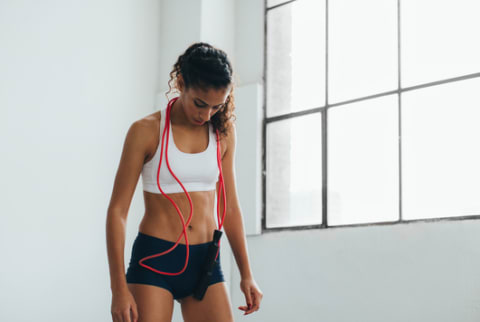Advertisement

Before I discovered Pilates, I wasn't very good at exercise. I pushed weights, jumped over steps, grunted through body pump classes—you name it, I tried it. And I got no results.
I blamed my lack of success not only on my "genetics” but also on the fitness methods that seemed to always fail me, no matter how much time and effort I put into them.
When I discovered Pilates and learned how to exercise with skill, my body experienced a massive transformation. I became leaner, longer, faster, and more powerful, and I loved it. I believed I had found the right exercise for my body type and rejected those fitness regimes that had yielded me so little.
I became certified and taught Pilates for a dedicated 15 years, honing my skills as I harnessed a masterful level of body control for both myself and my clients.
After many loyal years as a Pilates instructor, I moved to a new city and struggled to find a Pilates studio to call home. In my own practice, I was going through the motions during class, feeling burnt out and uninspired, and that scared me. The fitness method that had literally changed my life was no longer "my everything." I knew I needed a change and that I had to take a risk and turn back to those fitness methods that were a source of such deep frustration so many years ago.
Taking a leap of faith, I signed up for an early morning bootcamp program. On my first day, we began with a 10-minute run, 20 jumping jacks, 20 mountain climbers, 10 cherry pickers, and 10 push-ups. We repeated the series two more times then launched into a blistering upper-body routine, each shoulder set framed by a 200-yard sprint.
Heart racing and eyes tearing, I suddenly realized something: I'm actually enjoying this.
Getting out of my comfort zone taught me three things:
1. Bootcamp means community.
People of all ages, fitness levels, and genders attend bootcamp classes. These are men and women highly committed to their health and their fellow comrades, working hard together as a community. My early morning classes feel like a team effort, with everyone's positive energy pushing me to go the distance. Mind/body exercise can often be deeply internal, so it's exciting to get out of my own head and become part of a supportive, seriously dedicated troop.
2. Bootcamp hasn't changed—I have.
The exercises in bootcamp aren't unfamiliar. But this time around, I perform them differently. I engage my core muscles, I breathe deeply and consciously to keep my blood flowing, I stabilize my shoulders and hips before launching into military presses or jump-squats, and I rest when my body barks too loudly.
Bootcamp wasn't wrong for me all along—I had just been doing it wrong.
Pilates taught me that any exercise is an external vessel only, and the important stuff happens on the inside. We must fill an exercise with internal form: intention, precision, breath, control, and flow. Only then will we earn real results.
With my mind/body principles as a foundation, I am comfortable performing dynamic, explosive movements without feeling out of control or at risk of injury. I have crossed a threshold of skill that helps me enjoy a form of fitness that had been such a frustration so many years ago.
3. Judgment hurts the judge.
My bias against bootcamp first emerged from ignorance but was soon scaffolded by arrogance. After I found Pilates, I looked down on traditional fitness forms and judged people who liked them, exalting myself as a more intelligent and mindful mover. I was an obnoxious mind/body snob!
I am grateful to have had the opportunity to come back to my beginner's mind, to open myself up to the possibility that I can experience things in a new way and with a fresh perspective. I am grateful for my bootcamp teachers and the men and women who meet me out on the field at 5:30 a.m., their presence reminding me that "we're in this together." I am grateful to learn again (and again) that in order to grow and change, we must leave judgment behind.
